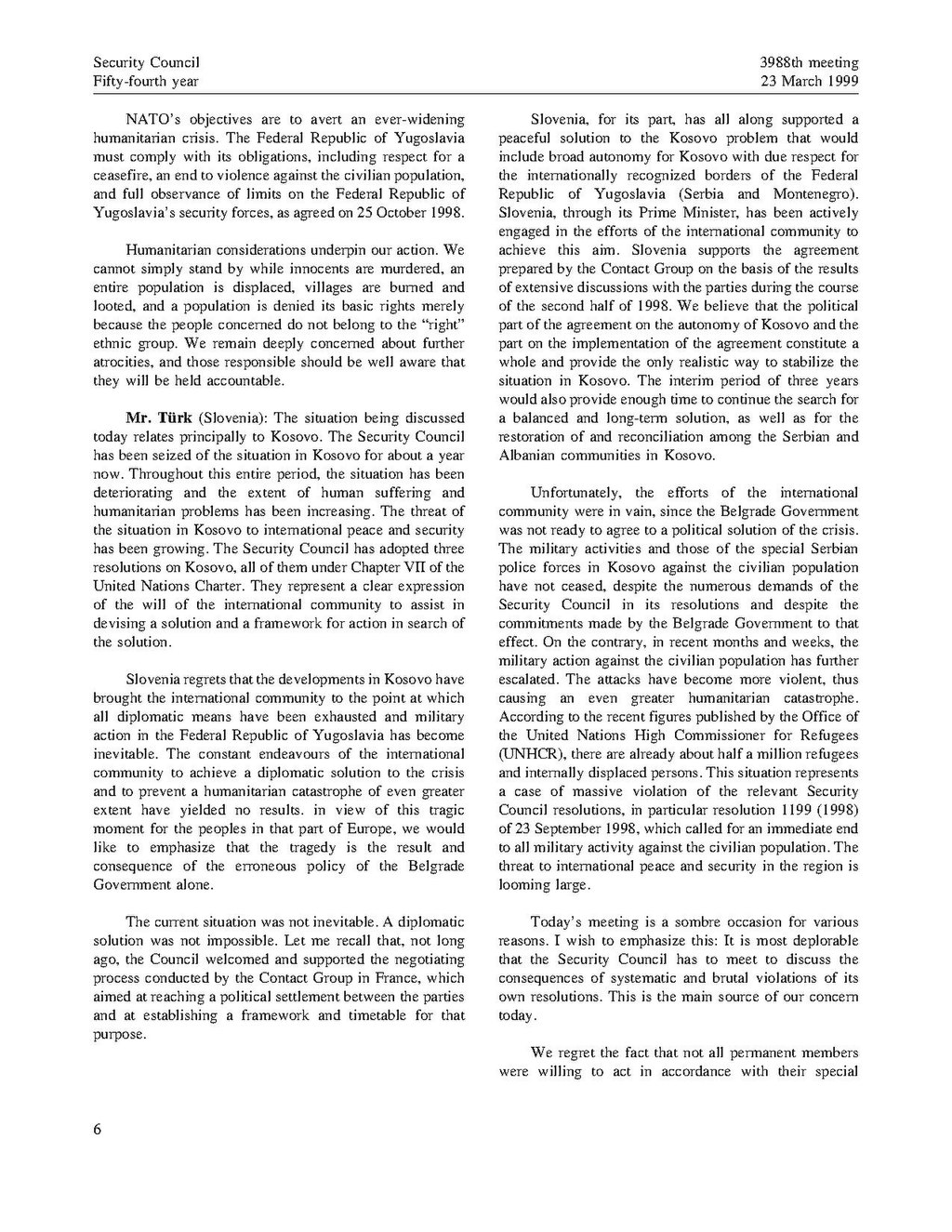NATO's objectives are to avert an ever-widening humanitarian crisis. The Federal Republic of Yugoslavia must comply with its obligations, including respect for a ceasefire, an end to violence against the civilian population, and full observance of limits on the Federal Republic of Yugoslavia's security forces, as agreed on 25 October 1998.
Humanitarian considerations underpin our action. We cannot simply stand by while innocents are murdered, an entire population is displaced, villages are burned and looted, and a population is denied its basic rights merely because the people concerned do not belong to the "right" ethnic group. We remain deeply concerned about further atrocities, and those responsible should be well aware that they will be held accountable.
Mr. Türk (Slovenia): The situation being discussed today relates principally to Kosovo. The Security Council has been seized of the situation in Kosovo for about a year now. Throughout this entire period, the situation has been deteriorating and the extent of human suffering and humanitarian problems has been increasing. The threat of the situation in Kosovo to international peace and security has been growing. The Security Council has adopted three resolutions on Kosovo, all of them under Chapter VII of the United Nations Charter. They represent a clear expression of the will of the international community to assist in devising a solution and a framework for action in search of the solution.
Slovenia regrets that the developments in Kosovo have brought the international community to the point at which all diplomatic means have been exhausted and military action in the Federal Republic of Yugoslavia has become inevitable. The constant endeavours of the international community to achieve a diplomatic solution to the crisis and to prevent a humanitarian catastrophe of even greater extent have yielded no results. in view of this tragic moment for the peoples in that part of Europe, we would like to emphasize that the tragedy is the result and consequence of the erroneous policy of the Belgrade Government alone.
The current situation was not inevitable. A diplomatic solution was not impossible. Let me recall that, not long ago, the Council welcomed and supported the negotiating process conducted by the Contact Group in France, which aimed at reaching a political settlement between the parties and at establishing a framework and timetable for that purpose.
Slovenia, for its part, has all along supported a peaceful solution to the Kosovo problem that would include broad autonomy for Kosovo with due respect for the internationally recognized borders of the Federal Republic of Yugoslavia (Serbia and Montenegro). Slovenia, through its Prime Minister, has been actively. engaged in the efforts of the international community to achieve this aim. Slovenia supports the agreement prepared by the Contact Group on the basis of the results of extensive discussions with the parties during the course of the second half of 1998. We believe that the political part of the agreement on the autonomy of Kosovo and the part on the implementation of the agreement constitute a whole and provide the only realistic way to stabilize the situation in Kosovo. The interim period of three years would also provide enough time to continue the search for a balanced and long-term solution, as well as for the restoration of and reconciliation among the Serbian and Albanian communities in Kosovo.
Unfortunately, the efforts of the international community were in vain, since the Belgrade Government was not ready to agree to a political solution of the crisis. The military activities and those of the special Serbian police forces in Kosovo against the civilian population have not ceased, despite the numerous demands of the Security Council in its resolutions and despite the commitments made by the Belgrade Government to that effect. On the contrary, in recent months and weeks, the military action against the civilian population has further escalated. The attacks have become more violent, thus causing an even greater humanitarian catastrophe. According to the recent figures published by the Office of the United Nations High Commissioner for Refugees (UNHCR), there are already about half a million refugees and internally displaced persons. This situation represents a case of massive violation of the relevant Security Council resolutions, in particular resolution 1199 (1998) of 23 September 1998, which called for an immediate end to all military activity against the civilian population. The threat to international peace and security in the region is looming large.
Today's meeting is a sombre occasion for various reasons. I wish to emphasize this: It is most deplorable that the Security Council has to meet to discuss the consequences of systematic and brutal violations of its own resolutions. This is the main source of our concern today.
We regret the fact that not all permanent members were willing to act in accordance with their special
